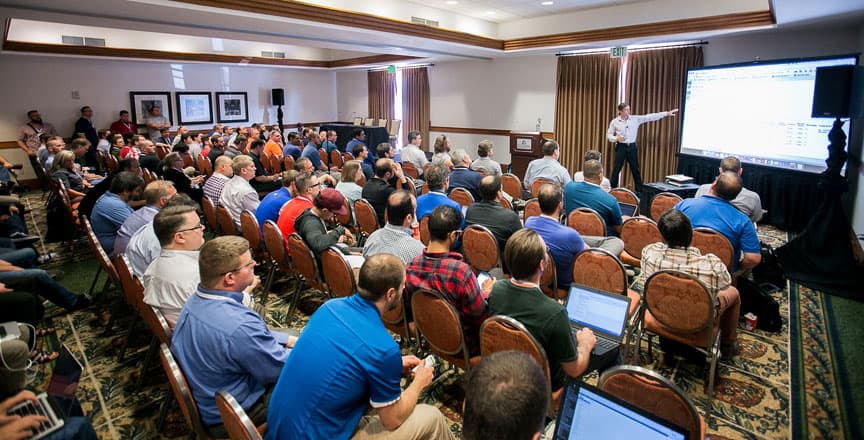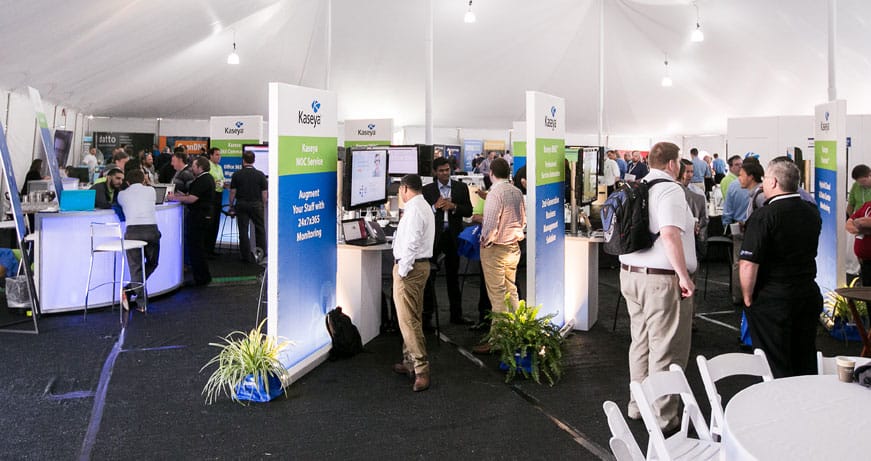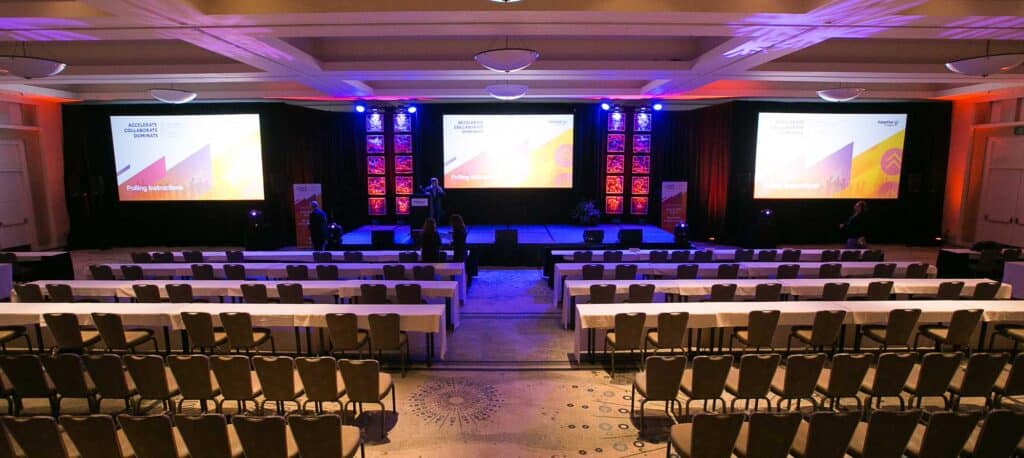So you’ve been tasked with planning a corporate event for your company. A million questions are rushing through your head – what is everything you need for a successful event? How do you make sure nothing is overlooked or missed? What if something goes wrong? Where do you even begin?
Look no further! This is your complete corporate event planning checklist. We will look, in depth, at the different elements of successful event execution to help you create the event of your dreams (and your boss’).
Event Details:
The first thing you need to do to start the event planning process is to outline all the details of your event. We’d recommend considering the following:
- Who?
- Who is this event for? Is it for your whole company? For your customers? For only your top sales employees? Determining who the event is for will help you outline the structure of your event and whether you need a meeting room for 15 board members, or are planning a multi-day conference for your top sales employees.
- What?
- The what is setting your strategy for the event.
- When?
- What is the timing of your event? Is it going to be in the summer? In the fall? Narrowing down your dates or having a couple of options will be necessary when you are solidifying your venue. More on that later.
- You also need to determine the length of your event. Is it going to be just for the evening? Two days? Maybe even a week?
- Where?
- You also need to determine the event venue. Is it going to be local and near where your office is? Will it be a destination event that people will travel to?
- Why?
- This goes hand-in-hand with your who. Why are you holding this event? What is the event’s purpose? Determining both the who and the why you’re holding your event will help you solidify the structure and details of your event.
- How?
- How are you going to pull off the event? This is where you will develop your plan. You will need to create a timeline for planning and decide on how you will develop and execute the event.
- How much?
- How much is it going to cost? This will become your budget. More on budgeting an event below!
Timelines:
You’ve got your event details figured out – now it is time to develop your timeline. With your timeline, you will list all the tasks that need to be accomplished and the dates on when you want to accomplish them by. Some of the dates will be hard deadlines as outlined by varying contracts with your venue and vendors. Other dates are more fluid and you are able to determine the deadline for which you want the tasks accomplished. Make sure to refer back to your timeline frequently throughout the planning process to make sure you are on track!
 Budget:
Budget:
Once you’ve determined the details of your event and the timeline for the planning process, one of the most important things you need to do is create the event budget. The budget will become your guide throughout the planning process and help you make decisions when it comes down to the nitty-gritty. Maybe you’ve been given an unlimited budget and free reign of the event. Or maybe you have a stricter budget and so the fire dancers and lion tamer might need to get cut. You can find a more in-depth guide to building your event budget here.
Venue Selection:
Your event outline, timeline, and budget are completed so now the real planning can begin. The first thing you need to do is find the event venue so you can solidify your location and dates. You can do this process yourself by researching different venues that match your criteria and reaching out for their availability. Your third party provider or an event vendor like Vario can help you find the perfect venue. Vario has a proprietary site inspection process that optimizes hotels and other venues so you don’t have to. Once you have found the venue you like, you will need to request a contract. Make sure you carefully review the contract in detail before signing.
Marketing: Registration, Website, Marketing, Email
Hosting an event wouldn’t be possible without having people in attendance. An important part of the planning process is getting information out about the event and giving interested attendees the opportunity to register or RSVP. Nowadays, there are many event specific websites where individuals can find out all the information about the event in one place. Websites usually include basic event details (date/location), tentative schedules, travel information, accommodation information, showcased speakers (if applicable), FAQs, contact information and a link to the registration page. Registration is where you will collect information about your attendees – basic information such as name, contact information, company, job title, an emergency contact, and dietary restrictions and event-specific information such as if they are planning to attend Tuesday nights’ dinner. You can also collect payment from each registrant if there is a fee associated with the event.
Now that you have a website with all your event information and a place for the interested individuals to register, it’s time to get the word out. Email blasts and social media are digital ways of marketing. You can also take a more traditional approach to marketing such as mailing out promotional pieces.
Hotel and Rooming:
Whether you’re hosting your event at a hotel or your event requires travel, securing a hotel room block for your guests is a must! A room block is a negotiated set of rooms within a hotel at a special rate. This price is only accessible to your attendees and can be contracted to be a guaranteed lower rate than booking on your own. The hotel will supply a booking link and call-in information for attendees to book their room – this information should be added to your event website. There are several ways in which to manage your room block. Attendees can be solely in charge of their reservations and directed to book either online or by calling the hotel. You can be in charge of the rooming list, collect each attendee’s travel information, and work with the hotel to book all the rooms – this includes being the main contact for updating reservations with the inevitable travel changes attendees will have. You could also do a mix of individual booking and a rooming list for your VIPs.
Vario can assist with navigating all of the hotel and rooming logistics. This would include room blocks, food and beverage, audio/visual, entertainment, and all the other details that make your event come together.

Food and Beverage:
Everyone loves to eat and drink – so the food and beverage (F&B) portion of your event is very important to ensure happy attendees. Depending on the timeline of your event, determine which meals you will be providing to attendees. Breakfast, lunch, dinner, coffee breaks, receptions, and evening functions are all opportunities to feed your attendees and keep them invested and engaged in the event. Not sold on the menu? Ask your vendor to work with their chef to create meals that are sure to delight your attendees.
Food allergies and preferences are something to keep in mind when planning your menu. From gluten-free to vegan to Kosher, you need to make sure everyone is able to eat. Dietary restrictions should be a question asked during the registration process and will help you anticipate the number of attendees with special preferences. Without getting into specialty ordering, you can plan for a lot of the preferences with the venue menu. Always include vegetarian options with meals and receptions. See if there are any meals that are already considered gluten-free. You can also order specialty meals such as vegetarian or gluten-free that the venue will hold in the back for the certain attendees. If you have Kosher individuals, the venue will work with you to order those meals as they usually require bringing in from an outside source. Also, make sure to ask your venue to have each food item labeled with their allergen information, so there is no question on whether something is gluten-free or not.
Food and Beverage minimums are usually a standard in venue contracts. This is a contracted number of what you promise to spend at the venue in F&B. Keeping a separate budget particular to F&B will help you keep on track to ensure the minimum is met.

Audio/Visual:
From small presentations to large corporate conferences, to everything in between, audio / visual (A/V) is important to keep your attendees engaged in your event and off their phones. Choosing the right A/V vendor is important to help you determine the appropriate scale and design of your event and to help you bring your ideas to life. Some venues have in-house A/V teams, but to ensure your lighting and design concepts come to life, a trusted outside A/V vendor is highly recommended. An outside A/V partner will share your vision and priorities and introduce you to the newest event technology out there that you can implement at your event.
Management:
Decor, security, temporary staff to help onsite, an exhibit services company if you have an exhibit or tradeshow floor, transportation and a signage company for printed material are several vendors to consider hiring to help you pull of your event. Hiring an outside corporate event management company would help you select and manage your various partners and even help select your entertainment from live music to aerial dancers.
Emergency Planning Document:
In today’s world, security and safety are at the forefront of everyone’s mind. Creating an emergency document will help you prepare for any unforeseen challenges. Ask your venue if they have emergency exit procedures in case of a fire. Locate the nearest hospital and find the number for the local police.

Onsite:
The time has come, and now you’re onsite! Before the event kicks-off, it is important to set a Precon meeting with your venue and key vendor partners. This way you can run through the event, confirm any last minute changes, and meet the team that will help the event run without a hitch – usually for the first time. Now that the event is underway, your responsibility is to make sure the event runs smoothly and help with any last minute changes/ fire drills that arise.
Wrap-up and Post-Con:
The event is over, and you can breathe again! But just because the event has concluded, doesn’t mean your job is done. It is time to now reconcile the conference, finalize your budget, pay outstanding invoices, create and send attendee evaluations, and record final numbers. Having final numbers of meal counts and head counts per function of your event will help in the future if you plan to continue the event in years to come. It is also good to debrief with your team and record any areas for improvement so each year will get better and better!
Bring in the experts:
If this is your first time planning an event, or even if it’s not, hiring an outside event planning management company is the smartest decision you can make to ensure successful event execution. An outside event planner, like Vario, is the expert in the event planning world and will be your number one advocate with the trust of transparency to ensure that your event needs are met. With the knowledge of the best event partners out there and the power of negotiation, you will be ensured to get the best service and creativity at the best price. An event management company will become your comprehensive solution for all your event needs. They will be your trusted resource, problem solver, and manager of all the ever moving details that bring your vision to reality.







